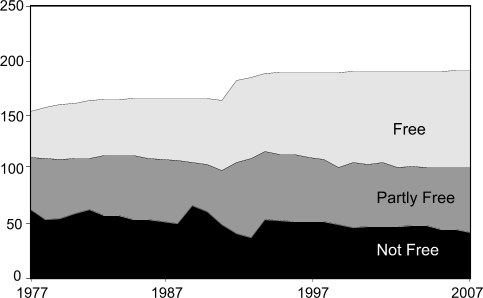4. How can genuine democracy emerge from authoritarian regimes?
Elements ofglobal governance such as ISOs, international treaties, multilateralorganizations, and self-organizing bodies on the Internet, along with theevolution of business systems and ICT, are augmenting governments’ democraticemergence. Although the perception and implementation of democracy differglobally, it is generally accepted that democracy is a relationship between aresponsible citizenry and a responsive government that encourages participationin the political process and guarantees basic rights. Since democracies tendnot to fight each other and since humanitarian crises are far more likely underauthoritarian regimes than democratic ones, the trend toward democracy shouldlead to a more peaceful future. Aging populations are increasing and theircountries tend to maintain democratic gains more than countries with youngerpopulations do. However, democracy and freedom declined over the last two yearsin one-fifth of the world’s countries, according to Freedom House. Four timesas many countries showed declines during 2007 as improved, and press freedom continueda six-year negative trend across the world, with increased intimidation ofjournalists and increasing control of media in the hands of a few in businessor government.
Thelonger-term trend is positive: the number of free countries grew from 43 to 90over the past 30 years, accounting for 46% of the world’s population. Countriespartly free expanded from 48 to 60, while 36% of the world population todaylives in 43 countries with authoritarian regimes. The movement fromauthoritarian to more democratic regimes is being aided by the growth of civilsociety, media access for pro-democratic actors, long-term economic stability,a focus on citizen participation, transparent judicial systems, e-governmentwith Internet access, increasing literacy, improved quality of governanceassessment systems, international interdependence, and the development of aglobal consciousness. Democratic forces will have to work harder to make surethat the short-term reversals do not stop the longer-term trend of democratization.
Internationalprotocols are needed to assist failed states or regions within states, andintervention procedures are needed when a state constitutes a significantthreat to its citizens or others. Although making development assistancedependent on good governance has helped in some countries, genuine democracywill be achieved when the people—not external actors—demand governmentaccountability. The ILO warns that workplace discrimination remains commonaround the world and that, in spite of some progress on gender and race,discrimination based on age, sexual orientation, and disability is increasing.
TheInternet allows self-organization around common ideals, independent ofconventional institutional controls and regardless of nationality or languages.Injustices in different parts of the world become the concern of thousands ormillions of people who then pressure local, regional, or internationalgoverning systems to find solutions. This unparalleled social power isreinventing citizens’ roles in the political process and changing institutions,policymaking, and governance. However, the development of methods to counterinformation manipulation, as well as increased freedom of informationtransmission, will be important for continued democratic consolidation.Organized crime, methods to tamper with election results, information warfare,and the potential of individuals to make and use weapons of mass destructionshould be seriously addressed in order to build a healthy global democracy.
Challenge 4 will be addressed seriously when strategies toaddress these threats are in place, when less than 10% of the world lives innondemocratic countries, when the number of armed conflicts (those with 1,000or more deaths per year) diminishes by half, and when voter participation inmost democracies exceeds 60% in most elections.
Regional Considerations
Africa: Democratization has regressed over the past severalyears, with failed state policies, rampant corruption, and ethnic tensions inKenya, Nigeria, Democratic Republic of Congo, Somalia, and Zimbabwe. FreedomHouse rated 11 of the 48 countries in the region “free,” while 15 regressed and6 made improvements. The Charter on Democracy, Elections and Governance adoptedby the African Union in 2007 sets democratic standards to be met by Africangovernments and provides a framework for assessing progress. The Pan AfricanParliament might get legislative power in 2009.
Asia and Oceania: Afghanistan, Bangladesh, Pakistan, thePhilippines, and Sri Lanka all saw declines in their Freedom House ratings.China accounts for half of all those living in “not free” countries andfrequently blocks access to Web sites such as YouTube and Wikipedia. FreedomHouse rates 16 of Asia’s 39 countries as “free,” 13 as “partly free,” and 10“not free.” Only 7% of the region’s population had access to free media in2007. ASEAN adopted a new Charter to foster integration and democracy. In theMiddle East, Israel remains the only country rated “free,” while 6 countriesare “partly free” and 11 are rated “not free.” The Arab League could play animportant role in improving democracy in this region. Political demonstrationsin South Korea are increasingly conducted in cyberspace, opening potentials forgreater participatory democracy.
Europe: The EU is a champion of public participation inpolicymaking. All 27 EU countries are rated “free.” Currently 8 million illegalimmigrants are estimated to be in the EU. New regulations were adopted tostrengthen and harmonize the legal system of migration and immigrants’integration across the Union. Countries hoping to join the EU are working todevelop their democratic institutions and cultures. In some of the formerSoviet Union and Central and Eastern Europe (non-EU) countries, the tendency towardautocracy, corruption, and lack of progressive institutions hinders thedemocratization process. Russia has begun implementing its national planagainst corruption.
Latin America: Latin America has the highest level ofinequality in the world, and organized crime, corruption, and repression ofcivil liberties threaten many of its young democracies. Populist governmentspromise to improve social justice along with economic growth. The Union ofSouth American Nations is intended to strengthen regional integration anddemocracy. However, censorship, as well as violence and intimidation againstmedia by organized crime groups, are deteriorating the freedom of the press inthe region.
North America: Although established democracies, Canada andthe U.S. are faced with powerful lobbying, increased corruption,freedom-restrictive regulations, and centralization of media. Yet having awoman and an African-American in the 2008 Democratic Party presidentialnomination race is a historic moment for the U.S. and for world democracy.There are censorship concerns over new Canadian legislation that allows thegovernment constraints over film and television productions deemed “contrary topublic policy.” Direct voting on issues via the Internet should be considered toaugment representative democracy.
Figure 3. Global trends of freedom

Source: Freedom in the World 2008, Freedom House